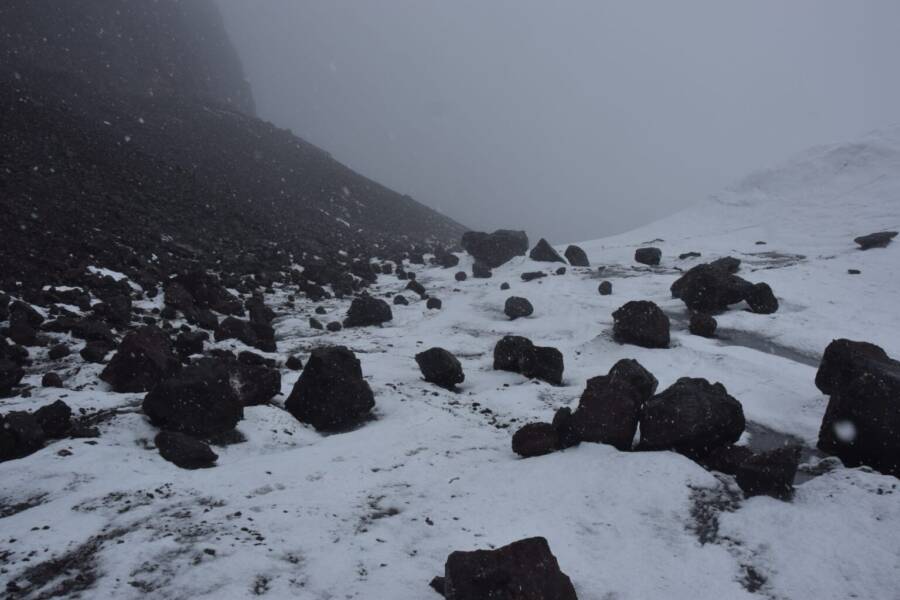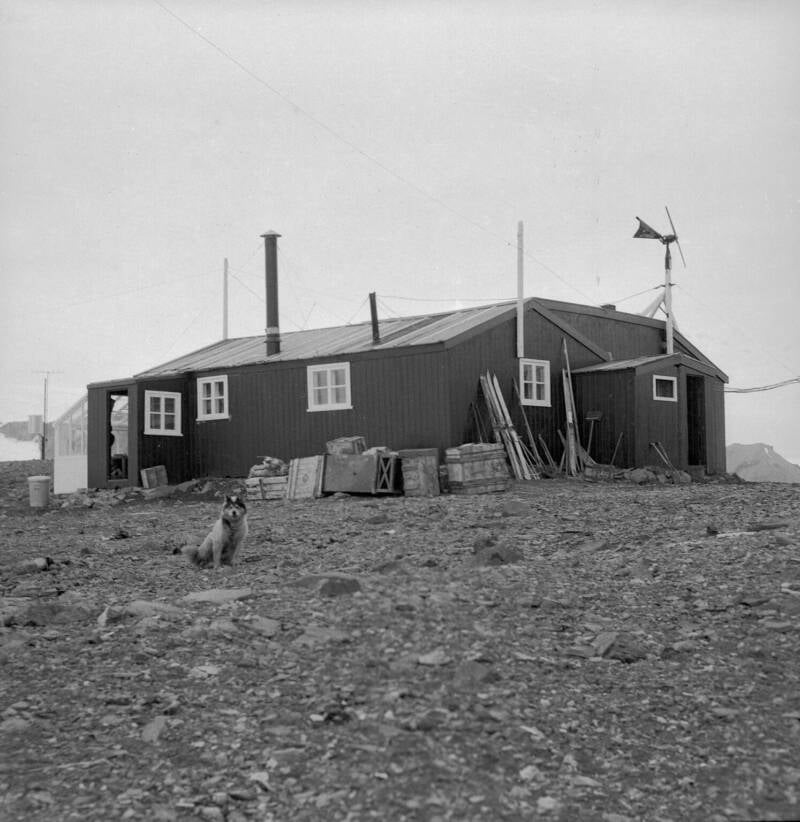Dennis "Tink" Bell was just 25 years old when he vanished while exploring the Ecology Glacier in July 1959.

British Antarctic SurveyDennis Bell (left) with his research colleagues in Antarctica and the dogs who worked with them.
The remains of a lost Antarctic researcher have finally been recovered, 66 years after he fell into an icy crevasse while conducting a survey.
A Polish research team discovered bone fragments and more than 200 personal items on Ecology Glacier in January 2025. DNA analysis has confirmed that they found the remains of Dennis “Tink” Bell, a British researcher who once worked at Admiralty Bay Base on King George Island.
Before his 1959 death, Bell worked as a meteorologist for the Falkland Islands Dependencies Survey (FIDS), the organization that later became the British Antarctic Survey (BAS). Bell will now finally be laid to rest in the U.K.
How Dennis Bell Tragically Disappeared Into An Antarctic Crevasse

Henryk Arctowski Polish Antarctic StationDennis Bell’s remains were ultimately found among exposed rocks on the Ecology Glacier.
On July 26, 1959, Dennis Bell and surveyor Jeff Stokes headed out earlier than the rest of their four-person team to begin a survey on an ice plateau above the Ecology Glacier, according to the British Antarctic Survey.
Cautiously, Bell and Stokes navigated a field of treacherous crevasses, but the dogs pulling their sleds soon began to tire. Bell started walking out in front of his sled, without his skis, to encourage the dogs to keep moving.
In the blink of an eye, Bell was gone. He had fallen down a 100-foot-deep crevasse that had been hidden by the deep snow.
Stokes heard Bell calling up to him and sent down a rope. After Bell tied the rope to his belt, he was pulled up by Stokes and the dogs. It seemed like Stokes would be able to rescue Bell, but tragically, the belt snapped.

Roger Todd-White; Archives ref: AD6/19/2/G176The Admiralty Bay Base where Bell and his colleagues worked.
Bell immediately fell back down into the hole. Stokes called down to him, but he got no response this time. Meanwhile, weather conditions were quickly worsening and Stokes was forced to return to his base.
As soon as conditions improved, the researchers returned to the site of the incident, hoping to find Bell alive. But it was clear that he hadn’t survived, and his body would remain in Antarctica for decades.
“There was no conclusion. There was no service; there was no anything. Just Dennis gone,” Bell’s younger brother, David Bell, now 86, told the BBC.
Over Half A Century Later, Dennis Bell Finally Comes Home

British Antarctic SurveyBell (right) with his colleagues at the Admiralty Bay Base on Christmas.
Now, 66 years after Dennis Bell’s tragic death, Polish researchers have recovered his remains, bringing closure and solace to his family.
Members of a Polish Antarctic expedition were conducting research on a receding glacier in Antarctica, when they suddenly found bone fragments and more than 200 personal items among the exposed rocks in January 2025. DNA testing later confirmed that the bones belonged to Dennis Bell.
Among the personal items uncovered was radio equipment, a flashlight, ski poles, an inscribed Erguel wristwatch, and a Swedish Mora knife.
The remains and the items were transferred to the Falkland Islands on the research ship Sir David Attenborough. From there, Bell’s remains made the journey back home to the U.K., accompanied by the Royal Air Force and His Majesty’s Coroner for British Antarctic Territory, Malcolm Simmons.
DNA testing was conducted by Denise Syndercombe Court, a professor in forensic genetics at King’s College London. She confirmed the match using DNA samples from Bell’s surviving brother and sister.
“When my sister Valerie and I were notified that our brother Dennis had been found after 66 years, we were shocked and amazed,” David Bell said in response to the news. “The British Antarctic Survey and British Antarctic Monument Trust have been a tremendous support and together with the sensitivity of the Polish team in bringing him home have helped us come to terms with the tragic loss of our brilliant brother.”
Dennis Bell was just 25 when he disappeared and died. In Antarctica, his job as a meteorologist was to collect data from weather balloons and assist in surveys of the region. He was also known as the best cook at Admiralty Bay. To his brother David, though, Dennis was simply his “hero.”
David currently lives in Australia, but he will be making the trip back to England to help his sister Valerie finally put their sibling to rest.
“It’s wonderful; I’m going to meet my brother,” David said. “You might say we shouldn’t be thrilled, but we are. He’s been found — he’s come home now.”
Next, learn about Operation Highjump, the U.S. military expedition to Antarctica in 1946. Then, take a look at vintage photos of Antarctica.





